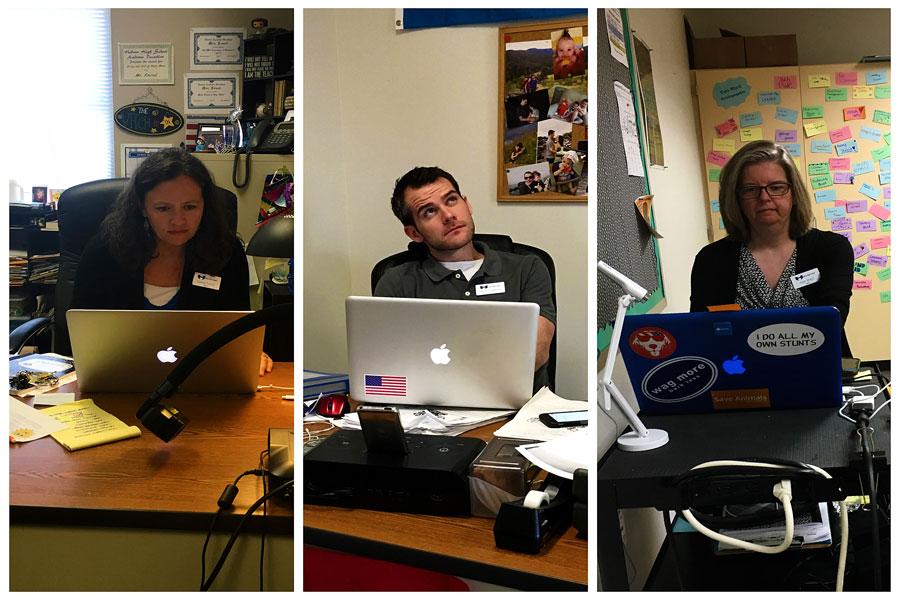‘Hebroninklings’ brings teachers together
The creation of the ‘Hebroninklings’’ came from a New Year’s resolution English II teacher Donna Friend made in 2014 to start a blog. The ‘Hebroninklings’ are a group of teachers that blog weekly about their ‘classrooms, philosophies and experiences.’
Friend’s love for blogging started as a journaler in high school which carried into college but eventually she stopped. After remembering the joy that writing brought her, she decided to start blogging again.
“I think the first inspiration [to blog] came from some workshop stuff I had been to where more and more presenters were saying ‘It’s hard to expect our students to write when I don’t write,” Friend said. “I never considered myself a writer but I remember how much fun I had and how much fun it is now as an old lady to go back and look at what I wrote at 18 is hysterical. So I thought for those reasons, I should try again.”
After talking to her colleagues, AP Government and AP United States History teachers Travis Fitzgerald and Travis Zuber, the three of them decided to blog together.
“We kept talking about how hard it is sometimes to write about what we wanted to write and we realized it’s a lot more fun to actually have a community of writers,” Friend said. “Last spring semester, we decided that we would post once a week on our blogs and that if we didn’t post, we would buy the other one a Sonic drink or a coffee from Starbucks.”
Over the summer, it was decided that a inclusive blog would become open to every staff member on campus. Thus, the Inklings Blog was created. Over time, many teachers from different departments joined the blog. English teacher Kate Mayo was one of them.
“It’s given me a new outlet,” Mayo said. “A new place to share those thoughts. Blogging lets me think about what I want to say. I can type out what I want to say, leave it for a minute and then come back to it later and I could change that.”
Mayo feels that writing is a much easier process than speaking. It’s an easier way for her to express what she is feeling and not be taken the wrong way.
“My blog is a window into who I am as a person,” Mayo said. “It’s really personal. If you go back and read my semicolon post, you learn that I grew up with a single mother in a small town. She worked as much as she could and I was pretty much raised by my relatives. So for me those are aspects of my personality and culture that makes me different from other people.”
Blogging has also been an outlet for Mayo to talk about sensitive subjects in her life.
“The most difficult post I made was about dealing with depression and dealing with my father who died when I was a kid and kind of everything that that encompasses,” Mayo said. “It was way easier for me to write it than it is for me to talk to anybody it. My story is there and while I may not tell it to you personally, you know that about me. You kind of have a better understanding of the person that I am.”
As one of the original creators, Fitzgerald has had a love for writing that dates back to his college days. He and his friends created a newsletter of fake satirical news stories.
“I love to write and a lot of the time I write for me,” Fitzgerald said. “I used to be a legislative reporter but the kind of stuff that I wrote was kind of boring. I would report on bills and stuff that was going on in the capitol but I couldn’t be creative or anything.”
When Fitzgerald worked in the Peace Corps for 17 months, he resorted to blogging as a form of communication.
“I did community development in West Africa and so part of it was to stay connected and part of it was shameless promotion,” Fitzgerald said. “I’ve always wanted to be a writer. I had this dream of someday taking all of my blog entries and turning them into a book about the Peace Corp. Writing an actual book was out of question. But keeping a blog started off more for just me. They’re just thoughts that I don’t know where to put. It’s just my little corner of the internet.”
Fitzgerald views the blog as a way for people to see the other side of being a teacher. Fitzgerald has also incorporated blogging into his teaching style.
“The blog is an outlet for me to be like a soapbox,” Fitzgerald said. “Because there are people with deeply held views and it’s a place for me to articulate things I normally wouldn’t say in the classroom. It’s personal opinions, world views, my religious faith. It’s the other side of being a teacher. The blog serves as ‘This is who I’m really like’.”
Fitzgerald has also found a way to incorporate blogging into his AP Government class. Throughout the semester, his students are required to blog about a book that is completely against their beliefs which Fitzgerald calls their ‘Political Dark-side’.
“I don’t think I would’ve done it [the class blog] had I not started blogging with some of the other teachers,” Fitzgerald said. “When you see their blogs you get a sample of how they see the world.”
The blogs have also helped to spread awareness to the importance of reading and writing for students in the classroom and outside.
“The whole reading and writing initiative, Hebron Reads and now a hashtag that says ‘Hawkswrite’ and just as a staff we are trying to be more aware of using reading and writing as a way to learn in our classrooms and that it’s not just an English teacher’s job,” Friend said. “In life we read and write to learn and to explain and we could do that on any topic. We want our students practicing that everywhere.”

Senior Shreya Rao is the managing editor and this is her third year on the staff. She finds confidence in her eyebrows and she also has an interest for...



